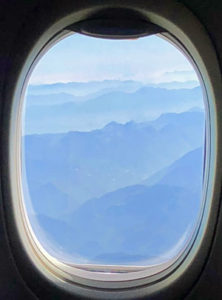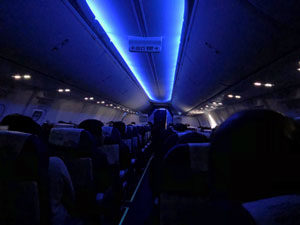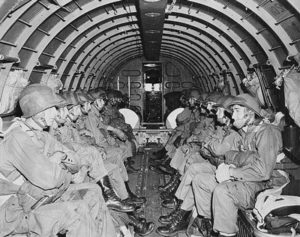Far western China, December 6, 2017
The city of Kunming reminds me somewhat of Denver, except the weather is better and the scale is massively bigger. At an elevation of over 6,000 feet, it has for centuries been a trading center on the ancient Silk Road. By some counts, about six million people now live here. When my father served here during World War II, it was a lot smaller and dominated by the American air base. From there, US and Chinese fighters and bombers mobilized to battle Japan.
After a brief morning visit, we boarded a flight on the final leg to Tengchong, near the border with Myanmar. These flights are in modern aircraft, efficient, clean, packed with locals, and managed by courteous attendants. They are smooth and quiet and on time. They sail well above the ragged peaks and turbulent winds of the mountain ranges below.
 The planes my father flew were the opposite in every respect. He guided bombers and C-47s from the Allied bases near Karachi, India, across the infamous stretch of the Himalayas known as the “Hump.” Those machines were loud, slow, unpressurized and freezing cold, threading the mountains at 20,000 feet. If strafed by Japanese ground fire or fighter planes, as they often were, the blood of the dead and wounded could freeze in puddles on the flight deck.
The planes my father flew were the opposite in every respect. He guided bombers and C-47s from the Allied bases near Karachi, India, across the infamous stretch of the Himalayas known as the “Hump.” Those machines were loud, slow, unpressurized and freezing cold, threading the mountains at 20,000 feet. If strafed by Japanese ground fire or fighter planes, as they often were, the blood of the dead and wounded could freeze in puddles on the flight deck.
And yet, I have no idea what my father actually went through, because he never talked about any of it. When asked what it was like in the war, he just said, “We got shot at a lot.”

 I know I am flying in close proximity to routes he often flew, likely at times even following the same flight path. But the distance between now and then is immeasurable, with such incongruity between this commercial aircraft’s serene interior and that of the shuddering war machines filled with terror and courage that were his daily bread. Perhaps it is in order to understand something of what he and his Chinese comrades endured that I am making this trip, to revive a sense of connection between their world and mine.
I know I am flying in close proximity to routes he often flew, likely at times even following the same flight path. But the distance between now and then is immeasurable, with such incongruity between this commercial aircraft’s serene interior and that of the shuddering war machines filled with terror and courage that were his daily bread. Perhaps it is in order to understand something of what he and his Chinese comrades endured that I am making this trip, to revive a sense of connection between their world and mine.
This doesn’t mean my making sense of their suffering. War, like sin, is hideous. Sometimes we choose it against all reason. Other times, we stumble into it. On occasion, we have no choice, unless we want a greater evil to triumph. Regardless the reason, lives are cut short, families devastated, nations and cultures cut to pieces, and God’s fragile creation is scarred and desecrated. One can only marvel that a conspiracy of pride, greed and stupidity – a perfect storm of the worst in human nature – should reveal the best, the love, the sacrifice, and the sheer bravery of so many, including those whose children I am about to meet and whose stories I am about to hear. So this pilgrimage is a Via Crucis, a journey in the Way of the Cross. I am seeking to bind my heart to this far-away world and carry it back into my own, because I know I have something to learn in this, about what it means to bear the name of Christ Crucified, to be His witness, in my own time and place.
In John’s Gospel, Nicodemus occupies this role. Before he meets Jesus, he is a comfortable man, well-born, educated and elite, a first-class politician. He comes to Jesus early on, by night, to see if there isn’t some comfortable way of following Him. What he gets instead is a crisis. Unless a man be born again…(Jn. 3:3). As soon as he hears it, he struggles, jokes, backs away. But the game is already over. He keeps his comfort for a time, hears the Lord preach, perhaps even invites him to his home, sees Jesus immerse Himself in the lives of the desperate, learns of His miracles, but Nicodemus keeps his distance. He is part of those who judge and condemn Jesus, even raising his voice in protest, yet still he is an observer – until after the work of the Cross is finished.
Then the distance disappears. Nicodemus braves shame and disgrace, pays for the burial spices, and goes by night again, this time to wrap with his own hands the pierced and beaten body of Christ, and lay it in a new tomb. It is hard to imagine a closer union with the Crucified One.
The Eastern Churches revere Nicodemus as an evangelist. I am sure he could never forget how the Christ had broken open his existence, how his personal landscape of council meetings, fashionable dinners, political jockeying in comfortable rooms, was shaken by his first visit to Jesus and shattered by his second. He was forever after a creature of two worlds – one very much the world of privileged human life, expecting smooth flight above the jagged peaks and howling winds of sorrow and loss, and the other, a life with the blood of Christ always on his hands, and with it a solidarity with those who suffer, with those who voyage through the unspeakable, the intolerable, the immeasurable dark.
As I flew toward Tengchong, I wondered if Nicodemus might be my companion in this most personal visit, to know in some measure the unspeakable things my father knew – the crews he lost, the death he averted while seeing others die, the senselessness and the carnage, and the strange emergence into light and peace on the other side. I had no idea what I might find. But even so far, I had learned this: that preaching the Gospel to the ends of the earth also means bringing the good news of Christ into the extremes of human experience, into houses of comfort and rooms of sorrow, into the days of our complacency and the hours of our terror, to find the Christ there, always with his word, “Take up your cross and follow me.”
